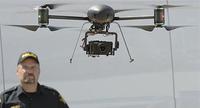-
As REAL ID looms, states revise driver's license laws

States must be in compliance by May with the regulations laid out in the 2005 REAL ID Act; the law, a recommendation of the 9/11 commission that investigated the 2001 terror attacks, creates a national security standard for state-issued identification cards to be used for purposes like boarding airplanes and entering federal buildings; REAL ID, originally intended as a counterterrorism tool, has had an unintended side effect that has won support of immigration enforcement advocates — it requires driver’s licenses issued to immigrants to expire at the same time as their stay in the United States, invalidating the licenses of immigrants who overstay their visas; states that allow illegal immigrants to obtain driver’s licenses are now revising their laws as a federal deadline for REAL ID approaches
-
-
Canadian police push limits of civilian UAVs laws

A local police department in Ontario, Canada is exploring the use of small unmanned aerial vehicles (UAVs) and pioneering civil aviation laws for future use of these aerial drones; in 2007 the Kenora Police Department set a new precedence when photographs of a homicide scene, taken from a UAV, were admitted as evidence in a trial for the first time; unlike the large drones used in Afghanistan these smaller UAVs are not practical for surveillance and are primarily used to record photos for trials and provide aerial reconnaissance in hostage situations or bomb threats; the small UAVs are equipped with several cameras including digital still, video, and Forward Looking Infrared (FLIR) camera; the Canadian government is working on developing regulations for the use of these UAVs in civilian airspace
-
-
Airport Screeners allowed to unionize and bargain collectively
John Pistole, the head of the Transportation Security Administration (TSA), last Friday announced that he would authorize unions to bargain on behalf of the TSA’s 45,000 airport screening officers; unions will be allowed to bargain collectively over specific issues including regulations on vacation time and shift assignments, workplace transfers, and recognition for good work; topics that unions usually bargain for like pay, retirement, benefits, disciplinary standards, job qualification rules, safety equipment and where it is deployed will not be open to negotiation; this unique arrangement is designed to allow DHS the flexibility to quickly reassign screeners, change procedures, and alter equipment in response to a security threat; Pistole hopes that this arrangement will boost employee morale and performance; in surveys on employee morale and job satisfaction, TSA often performs poorly compared to other government agencies
-
-
PATRIOT Act extended by nine months

In a move last Tuesday which surprised the Republican leadership in Congress, 26 Republicans — seven of them freshmen — voted against the extension of the PATRIOT Act, which expires 28 February; the measure was defeated when the Republican leadership attempted to force it through a fast-track procedure that required a two-thirds majority, but the vote — 277 for and 148 against — fell short; the House last night, in 275 to 144 vote under regular procedure, extended the Act by nine month; the extension includes special “roving” wiretaps, which allow law enforcement officials to use one search warrant to monitor a suspect’s calls, even if he or she skips from phone to phone; traditional search warrants only apply to a single telephone line; the Senate is yet to act on the bill
-
-
U.K. plans new body for the regulation of nuclear power
The United Kingdom is setting up a new nuclear regulatory body; the Office for Nuclear Regulation (ONR) would be a new independent regulator, formally responsible in law for delivering its regulatory functions and consolidating civil nuclear and radioactive transport safety and security regulation in one entity
-
-
Arizona to vote on bill denying birthright citizenship

An Arizona bill that would put a stop to automatic U.S. citizenship for children of illegal immigrants could come to a vote next week; the state’s legislation would define a U.S. citizen as someone who has been naturalized, or someone born in this country who has at least one parent who has no allegiance to a foreign country; a group of state legislators known as the State Legislators for Legal Immigration (SLLI) is proposing legislation which would allow a state to issue two kinds of birth certificates — one to babies of people legally in the United States, and a different one to babies of illegal immigrants; SLLI says that lawmakers in as many as fourteen states plan to introduce bills on the matter this year
-
-
U.K. changes terrorist surveillance procedures
U.K. home secretary announces changes in manner in which terrorist suspects may be detained and questioned; modifications are in response to claims of overreaction to 9/11 and the London bus bombings; critics claim changes not enough
-
-
New tactics in war on terror -- litigation
Islamic extremists are increasingly using lawsuits to threaten and intimidate civilians across the world; the Danish newspaper Politiken, which published the controversial Danish Mohammed cartoons in 2005, has been hit by a civil lawsuit; a Danish MP was recently forced to plead guilty to hate speech for speaking his mind about Islam; civilians can also use the courts to go after extremists using similar tactics
-
-
King announces 112th Congress' Homeland Security subcommittees, chairmen
Representative Peter T. King (R-New York), chairman-elect of the House Committee on Homeland Security, announced Monday the homeland security subcommittees for the 112th Congress and his appointments of subcommittee chairmen
-
-
Software enables swifter justice
A system from the Eagan, Minnesota, company Intertech speeds the process of filing criminal complaints, eliminating steps that used to require paper; this summer, it received approval for its eCharging Web-based system, which cuts down on the time to process the complaints because officials sign off electronically through a password or fingerprint reader
-
-
ASIS International, BSI release Business Continuity Management ANSI standard
ASIS International, BSI have released Joint Business Continuity Management ANSI Standard; the standard provides auditable criteria with accompanying guidance for developing and implementing a business continuity management system that improves an organization’s ability to prepare for, respond to, and recover from a disruptive event
-
-
U.K. prepares for pro-WikiLeaks attacks on government Web sites

Britain’s national security adviser has warned that government Web sites are at risk of cyber attack from pro-WikiLeaks hackers; the office of Prime Minister David Cameron said security adviser Peter Ricketts has raised his concerns before an extradition hearing scheduled for today (Tuesday), when WikiLeaks founder Julian Assange is to appear at a London court; Cameron’s spokesman Steve Field said the government’s priority is Web sites dealing with information that belongs to members of the public; he said the government has particular concerns about Web sites used to file tax returns or to claim benefits, which store sensitive personal information
-
-
WikiLeaks's Assange to be indicted for spying "soon"

If charges against Assange are brought, it would reflect a watershed event in the United States, which has never successfully prosecuted a news organization for publishing classified information; a report released last week by the Congressional Research Service acknowledged that federal prosecutors would have a hard time making charges stick against the whistle-blower Web site, which operates almost entirely abroad; “There may be First Amendment implications that would make such a prosecution difficult, not to mention political ramifications based on concerns about government censorship,” the report states, adding that additional difficulties would arise from the fact “that the investigation implicates —- foreign nationals whose conduct occurred entirely overseas”
-
-
Lawmakers urge Obama to expand State Department's cybercrime reach
Lawmakers call President Obama to expand the U.S. State Department’s foreign policy mechanisms to address crime and security on the Internet; Senator Kirsten Gillibrand (D-New York) joined with Senator Orrin Hatch (R-Utah) to author the International Cybercrime Reporting and Cooperation Act; this bill will hold foreign countries accountable for cybercrime committed on their soil
-
-
Senate bill would require minimum cybersecurity standards for Internet
Senator Benjamin Cardin (D-Maryland) has introduced a bill that would require the U.S. government to work with the private sector to propose minimum standards for internet and cybersecurity safety; “Just as automobiles cannot be sold or operated on public highways without meeting certain minimum safety standards, we also need minimum Internet and cybersecurity safety standards for our information superhighway,” Cardin said
-
More headlines
The long view
The Center Can Hold — States’ Rights and Local Privilege in a Climate of Federal Overreach
As American institutions weather the storms of executive disruption, legal ambiguity, and polarized governance, we must reexamine what it means for “the center” to hold.
How to Reverse Nation’s Declining Birth Rate
Health experts urge policies that buoy families: lower living costs, affordable childcare, help for older parents who want more kids
Turnover Among Election Officials Reaches New High: Report
Election officials turned over at the highest rate in at least a quarter century during the last presidential election. Nearly 40 percent of election officials administering the 2024 election weren’t around in 2020.
Voting from Your Sofa Is Secure Enough – but Will It Be Allowed?
A new electronic voting system developed at NTNU can withstand attacks from quantum computers, meaning digital elections can be conducted securely, even in the future.
